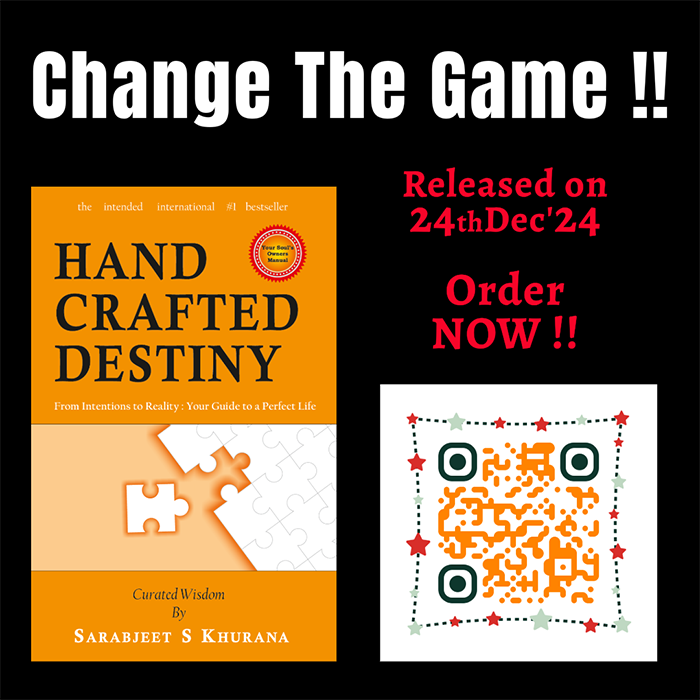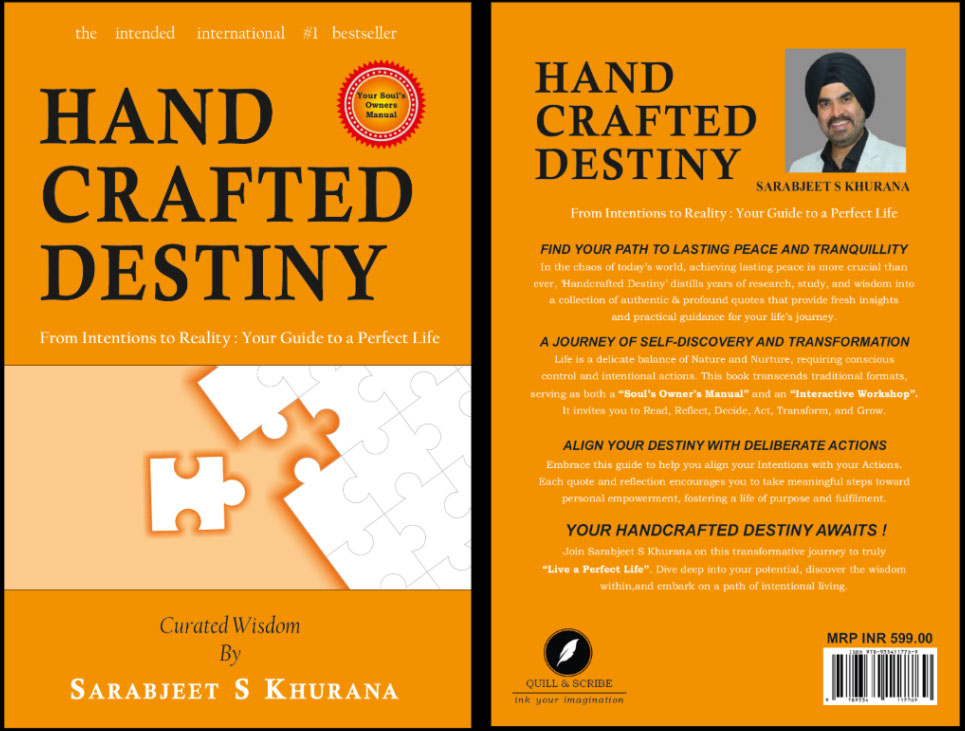How many times have you felt torn between what your mind says and what your heart feels? How frequently have you made decisions with a lingering sense of uncertainty? How many times have you reprimanded yourself for not having listened to your mind to witness your choices fail miserably? Numerous times, right? It’s likely that you’ve encountered these situations countless times. So, what steps have you taken to effectively tackle this predicament and confidently make decisions that harmonize both your heart and mind? Let’s explore the following narrative, and I assure you that it will provide you with valuable insights on how to master this delicate balance.
The human decision-making process is often influenced by the conflict between the heart (emotions, intuition) and the mind (logic, rationality). Striking the right balance between these two forces is crucial to making informed and fulfilling decisions. In many situations our heart may suggest one course of action, while our brain may point in a different direction. It’s a common dilemma faced by individuals when making decisions or choices in life, particularly in matters of relationships, career choices, or personal goals etc.
Emotions and desires can play a significant role in shaping our decisions, as they often reflect our deepest aspirations, values, and personal preferences. Sometimes, following our heart’s desires can lead to positive outcomes, personal growth, and a sense of fulfillment. However, it is also important to exercise caution and consider the rational aspects of a situation. Our brains provide us with logical reasoning, critical thinking, and the ability to evaluate the potential consequences of our actions. Ignoring rational thinking altogether can lead to impulsive decisions or disregard for important factors like practicality, feasibility, or long-term consequences.
The best approach to resolving this conflict depends on the specific situation and the importance of each factor. Sometimes, it’s beneficial to consider both emotional and rational aspects and find a balanced approach. Other times, one may hold more weight over the other. Ultimately, it’s a personal decision influenced by individual values, circumstances, and personal growth. Remember that there is no universally correct answer to this conflict. It’s important to trust your judgment and choose a path that aligns with your values and brings you a sense of fulfillment.
The question now arises is that if this is not straightforward then what to do? How to confidently trust our judgement?
The answer is; explore getting Coached…Yes, a professional coach can help by empowering us to make sound and aligned decisions.
No no, don’t jump to conclusions just yet…Complete the reading and then decide!
Now you will ask how this is possible? How can someone else help me decide?
Following is the answer!
Coaching plays a pivotal role in empowering individuals to navigate this internal conflict, fostering self-awareness, goal alignment, and the ability to evaluate options from different perspectives. By providing support, accountability, and guidance, coaches help individuals make decisions that are both emotionally fulfilling and logically sound, ultimately leading to a more balanced and fulfilling life.
Let’s understand this in some detail:
Developing Self-awareness and Clarity
Coaching facilitates self-reflection, helping individuals gain a deep understanding of their values, aspirations, and priorities. By exploring their inner desires and purpose, individuals can align their decision-making process with their true selves, enabling a more balanced approach that integrates both emotional and rational aspects.
Goal Alignment and Evaluation
Coaching supports individuals in clarifying their goals and defining success on their terms. With the help of a coach, individuals can evaluate decisions based on how well they align with their overall objectives, considering both the emotional fulfillment and the logical reasoning behind each choice.
Assessing Options and Considering Perspectives
Coaches assist individuals in exploring various options and alternatives available to them. By considering different perspectives, weighing pros and cons, and examining potential outcomes, individuals can make more informed decisions.
Overcoming Limiting Beliefs and Biases
Coaches challenge and help individuals address limiting beliefs or biases that may hinder their decision-making process. By identifying and reframing these barriers, individuals can expand their possibilities and make choices that are not solely driven by fear or external influences, fostering a balanced decision-making approach.
Accountability and Support
Coaches serve as accountability partners, providing unwavering support throughout the decision-making process. They offer a safe space for individuals to explore their thoughts, concerns, and uncertainties, while also providing guidance and encouragement to maintain focus and make decisions that honor both their heart and mind.
Building resilience
Coaching can help individuals develop resilience and coping strategies to deal with the potential challenges or setbacks that may arise because of their decisions. This can include managing emotions, adapting to changes, and staying committed to their chosen path.
It’s important to note that coaching is a collaborative process, and the specific techniques or approaches used may vary depending on the coach and the individual’s needs. By working with a coach, individuals can gain clarity, develop self-awareness, and ultimately make decisions that honor both their heart and mind.
So, if hiring a coach is a great approach then why aren’t people doing it so often? What is the hitch? What becomes the biggest challenge for us to decide on hiring a Coach?
The answer is “We don’t know what we don’t know”
In life, we are often limited by our own perspectives and knowledge. We may not be aware of the blind spots, biases, or limiting beliefs that shape our thinking and decision-making process. This is where the saying “You don’t know what you don’t know” comes into play. We need to recognize the concept that our perspectives and knowledge are inherently limited. We must appreciate the importance of recognizing blind spots, biases, and self-limiting beliefs that hinder our decision-making process.
We must explore real-life examples as they emphasize the transformative power of expanding our awareness and understanding through the guidance of a coach.
We may not have access to the insight on our own to expand our awareness and understand ourselves and the world around us. A coach can help to bring a fresh perspective, expertise and required insight by Uncovering Blind Spots. They can help us recognize patterns, biases, or self-limiting beliefs that may be holding us back from making balanced decisions. By shedding light on these blind spots, a coach can help us break free from our limited understanding and expand our possibilities. A coach offers an objective and non-judgmental perspective on our thoughts, emotions, and actions. They can provide valuable feedback and challenge our assumptions, helping us see situations from different angles. This broader view allows us to consider alternative options and make decisions that integrate both the heart and mind in a more balanced way.
By acknowledging that we don’t know everything and seeking the guidance of a coach, we open ourselves up to new insights, perspectives, and opportunities. With a coach by our side, we can make informed decisions that honor both our emotions and rationality, leading to a more fulfilling and balanced life.
Even knowing all this, deciding to hire a coach is not easy. Almost everyone procrastinates here…Why?
Here you go!
MYTH 1 – Cost: One of the primary reasons people hesitate to hire a coach is the perceived cost. Some individuals may view coaching as an expensive investment and feel uncertain about its return on investment. They may prioritize spending their resources elsewhere or believe they can handle personal or professional challenges on their own.
Myth-buster: While coaching may involve an investment, it’s essential to consider the long-term benefits and potential return on investment. Working with a coach can lead to improved clarity, enhanced decision-making skills, increased self-awareness, and accelerated personal or professional growth. The insights, strategies, and accountability provided by a coach can ultimately save time, help overcome obstacles, and lead to greater success and fulfillment. That too at the cost of a vacation!
MYTH 2 – Self-reliance: Many people have a sense of self-reliance and may prefer to solve problems independently. They may believe they can figure things out on their own and may be hesitant to seek external guidance or support. This mindset can lead them to overlook the potential benefits of working with a coach.
Myth-buster: While self-reliance is commendable, it’s important to recognize that seeking external guidance does not undermine one’s independence or competence. Even the most successful individuals benefit from diverse perspectives, support, and mentorship. A coach can provide valuable insights, challenge assumptions, and offer strategies tailored to individual goals, helping individuals achieve their desired outcomes more efficiently and effectively. Why did Federer have a coach his entire career?
MYTH 3 – Lack of Awareness: Some individuals may simply be unaware of the benefits that coaching can provide. They may not fully understand the role of a coach, the value they can bring, or the potential impact on personal growth, decision-making, and goal achievement. Without awareness, they may not prioritize or consider coaching as a viable option.
Myth-buster: Lack of awareness about the benefits of coaching is a common hurdle. However, becoming informed about the potential advantages can shift perspectives. Researching and understanding the positive experiences of others who have worked with coaches can provide insights into the transformative impact coaching can have on personal and professional development. Exploring testimonials, case studies, and success stories can help individuals recognize the value and potential impact of coaching. Talk to me!!
MYTH 4 – Fear of Vulnerability: Coaching often involves introspection, self-reflection, and exploring personal challenges. Some individuals may have reservations about opening and being vulnerable with a coach. They may fear judgment, feel uncomfortable sharing personal details, or worry about their privacy being compromised.
Myth-buster: While opening up and being vulnerable with a coach can initially be uncomfortable, it is crucial to remember that coaching provides a confidential and non-judgmental space. Professional coaches adhere to strict ethical standards and prioritize client confidentiality. Building a trusting relationship with a coach can create a safe environment for self-exploration, personal growth, and overcoming challenges. The vulnerability experienced during coaching can lead to breakthroughs and insights that may not be achieved through self-reflection alone.
MYTH 5 – Misconceptions or Skepticism: There can be misconceptions or skepticism about coaching. Some individuals may view coaching as therapy, counseling, or a sign of weakness, which can lead to resistance or avoidance. Others may have heard mixed reviews or encountered coaches who did not meet their expectations, contributing to skepticism about the effectiveness of coaching.
Myth-buster: It’s important to differentiate coaching from therapy or counseling. Coaching focuses on the present and future, emphasizing personal and professional growth, goal achievement, and decision-making. Coaches provide support, guidance, and accountability to help individuals unlock their potential and achieve desired outcomes. Exploring the credentials, qualifications, and testimonials of coaches can help address skepticism and ensure the selection of a coach who aligns with individual needs and goals
Once all the above is internalized we must explore the influence and impact of being spiritual. We must also thoroughly explore how being ‘Spiritual’ can play a significant role in helping individuals strike the right balance between their heart and mind. Spirituality provides a framework for individuals to cultivate self-awareness, emotional well-being, alignment with purpose, mindfulness, and access to guidance. These aspects support individuals in integrating the wisdom of both their heart and mind, enabling them to make decisions that are authentic, fulfilling, and aligned with their higher selves. By nurturing their spiritual connection, individuals can achieve a harmonious balance between their heart’s desires and their mind’s rationality, leading to more holistic decision-making and a greater sense of well-being.
Here’s how:
Self-awareness and Inner Guidance
Spirituality often encourages self-reflection and introspection, which allows individuals to develop a deeper understanding of their emotions, desires, and values. By connecting with their inner selves through practices like meditation or prayer, individuals can access their intuition and inner guidance. This inner wisdom serves as a compass that helps navigate the complexities of decision-making, allowing for a harmonious integration of both heart and mind.
Emotional Well-being and Compassion
Spirituality fosters emotional well-being by promoting self-acceptance, compassion, and empathy. When individuals cultivate a spiritual mindset, they develop a greater awareness and acceptance of their emotions, as well as the emotions of others. This awareness allows for a more balanced approach to decision-making, as it takes into account both logical reasoning and emotional needs. By acknowledging and honoring their emotions while considering rational thought, individuals can strike a harmonious balance between their heart and mind.
Alignment with Higher Purpose
Spirituality often involves a connection with a higher power or a larger sense of purpose. This connection can provide individuals with a broader perspective on life and their role within it. When individuals align their goals and decisions with their spiritual values and purpose, they find a greater sense of fulfillment and satisfaction. This alignment helps in making decisions that honor both the heart’s desires and the mind’s logical considerations, as they are in line with a deeper sense of purpose.
Mindfulness and Present Moment Awareness
Spiritual practices often emphasize mindfulness and being fully present in the moment. This mindfulness allows individuals to observe their thoughts, emotions, and inner dialogue without judgment. By cultivating this awareness, individuals can identify when their heart and mind are in conflict or out of balance. They can then take intentional steps to bring alignment and make decisions that are guided by both their heart’s wisdom and their mind’s rationality.
Seeking Wisdom and Guidance
Spirituality encourages individuals to seek wisdom and guidance from spiritual teachers, mentors, or communities. Engaging in meaningful conversations, receiving guidance, and learning from those who have walked a similar path can offer valuable insights and perspectives. By seeking external support from trusted sources, individuals can gain clarity, challenge their assumptions, and receive guidance that helps them strike the right balance between their heart and mind.
Conclusion
Life is a continuous journey of decision-making, and embracing this process can lead to personal growth and fulfillment. Hiring a coach provides valuable support, guidance, and accountability, empowering individuals to make informed decisions aligned with their authentic selves. By blending spirituality with coaching, individuals can tap into their intuition, seek higher guidance, and foster inner alignment, further enhancing their decision-making capabilities. Ultimately, embracing the interplay of coaching and spirituality allows individuals to navigate life’s choices with clarity, purpose, and a deep sense of connection to their true selves.
Reach out to me should you think you are ready!


